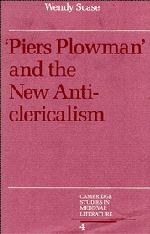Book contents
- Frontmatter
- Contents
- Preface
- Acknowledgements
- Note on quotations and references
- List of abbreviations
- 1 Introduction: tradition and the new anticlericalism
- 2 The usurpation of priestly power and the transformation of an antifraternal satire
- 3 Poverty: an old controversy and a new polemic
- 4 Charity: the ground of anticlericalism
- 5 Antireligious traditions and a new satire in the C-text
- 6 Clerical dominion and authority in new anticlerical literature
- Notes
- Bibliography
- General index
- Index of Piers Plowman citations
1 - Introduction: tradition and the new anticlericalism
Published online by Cambridge University Press: 09 February 2010
- Frontmatter
- Contents
- Preface
- Acknowledgements
- Note on quotations and references
- List of abbreviations
- 1 Introduction: tradition and the new anticlericalism
- 2 The usurpation of priestly power and the transformation of an antifraternal satire
- 3 Poverty: an old controversy and a new polemic
- 4 Charity: the ground of anticlericalism
- 5 Antireligious traditions and a new satire in the C-text
- 6 Clerical dominion and authority in new anticlerical literature
- Notes
- Bibliography
- General index
- Index of Piers Plowman citations
Summary
Anticlericalism was as important for the reading as for the writing of Piers Plowman, if we may judge by the notes and comments medieval readers recorded in the margins of the manuscripts. Readers were interested in the full range of the poem's anticlerical satire. Attacks on friars attracted a great deal of notice. The Great Doctor of theology, enjoying a hearty meal while the Dreamer and Pacience look on hungrily, was evidently not to be missed. Besides using notas to catch the reader's attention, annotators commented ‘be war of fals freris’, ‘contra fratres’, and ‘Doctours of freris’. One manuscript even includes a picture of a friar. Early readers also enjoyed the encounter between Mede and her friar. We find notes in the margins of this sequence such as ‘how freris shryuen folk’, ‘nota de frerys pat bepe confessours’, and ‘a comfessour as a frere comforted Mede and sayde as 3e may rede’. Sire Penetrans domos, the friar who stupifies Contricion in the final passus, attracted notes such as ‘ffrere flaterer’ and ‘ffrere leche’.
It was not just the antifraternal satire which medieval readers thought worthy of notice. Attacks on the higher ranks of the clergy also attracted comment. ‘Lo lordis and prelatis’, wrote a medieval reader beside a passage in which clerics are instructed to preach against the feasting of harlots, while with ‘beth war bischoppis’ an annotator endorsed criticism of bishops who ordain unworthy priests. Criticism of abuses among the parish clergy was also relished. Conscience's threat that benefices shall be removed from priests and parsons who hunt with anything but Placebo provoked ‘nota huntynge curatis’ in one manuscript.
- Type
- Chapter
- Information
- Piers Plowman and the New Anticlericalism , pp. 1 - 14Publisher: Cambridge University PressPrint publication year: 1989



